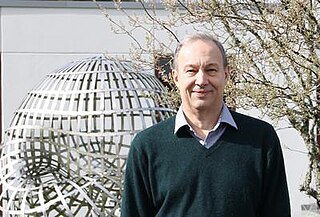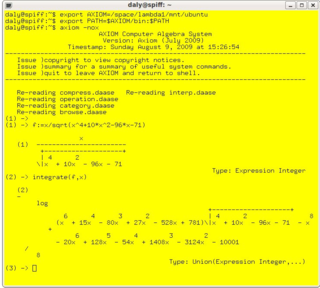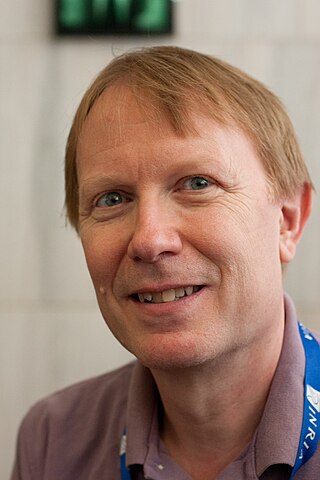Related Research Articles
The #P-complete problems form a complexity class in computational complexity theory. The problems in this complexity class are defined by having the following two properties:

The Gödel Prize is an annual prize for outstanding papers in the area of theoretical computer science, given jointly by the European Association for Theoretical Computer Science (EATCS) and the Association for Computing Machinery Special Interest Group on Algorithms and Computational Theory. The award is named in honor of Kurt Gödel. Gödel's connection to theoretical computer science is that he was the first to mention the "P versus NP" question, in a 1956 letter to John von Neumann in which Gödel asked whether a certain NP-complete problem could be solved in quadratic or linear time.
Johan Torkel Håstad is a Swedish theoretical computer scientist most known for his work on computational complexity theory. He was the recipient of the Gödel Prize in 1994 and 2011 and the ACM Doctoral Dissertation Award in 1986, among other prizes. He has been a professor in theoretical computer science at KTH Royal Institute of Technology in Stockholm, Sweden since 1988, becoming a full professor in 1992. He is a member of the Royal Swedish Academy of Sciences since 2001.
The Fulkerson Prize for outstanding papers in the area of discrete mathematics is sponsored jointly by the Mathematical Optimization Society (MOS) and the American Mathematical Society (AMS). Up to three awards of $1,500 each are presented at each (triennial) International Symposium of the MOS. Originally, the prizes were paid out of a memorial fund administered by the AMS that was established by friends of the late Delbert Ray Fulkerson to encourage mathematical excellence in the fields of research exemplified by his work. The prizes are now funded by an endowment administered by MPS.

Nitin Saxena is an Indian scientist in mathematics and theoretical computer science. His research focuses on computational complexity.

Éva Tardos is a Hungarian mathematician and the Jacob Gould Schurman Professor of Computer Science at Cornell University.

Aleksandr Aleksandrovich Razborov, sometimes known as Sasha Razborov, is a Soviet and Russian mathematician and computational theorist. He is Andrew McLeish Distinguished Service Professor at the University of Chicago.

The Tutte polynomial, also called the dichromate or the Tutte–Whitney polynomial, is a graph polynomial. It is a polynomial in two variables which plays an important role in graph theory. It is defined for every undirected graph and contains information about how the graph is connected. It is denoted by .
Umesh Virkumar Vazirani is an Indian–American academic who is the Roger A. Strauch Professor of Electrical Engineering and Computer Science at the University of California, Berkeley, and the director of the Berkeley Quantum Computation Center. His research interests lie primarily in quantum computing. He is also a co-author of a textbook on algorithms.
Information-based complexity (IBC) studies optimal algorithms and computational complexity for the continuous problems that arise in physical science, economics, engineering, and mathematical finance. IBC has studied such continuous problems as path integration, partial differential equations, systems of ordinary differential equations, nonlinear equations, integral equations, fixed points, and very-high-dimensional integration. All these problems involve functions of a real or complex variable. Since one can never obtain a closed-form solution to the problems of interest one has to settle for a numerical solution. Since a function of a real or complex variable cannot be entered into a digital computer, the solution of continuous problems involves partial information. To give a simple illustration, in the numerical approximation of an integral, only samples of the integrand at a finite number of points are available. In the numerical solution of partial differential equations the functions specifying the boundary conditions and the coefficients of the differential operator can only be sampled. Furthermore, this partial information can be expensive to obtain. Finally the information is often contaminated by noise.

The Hosoya index, also known as the Z index, of a graph is the total number of matchings in it. The Hosoya index is always at least one, because the empty set of edges is counted as a matching for this purpose. Equivalently, the Hosoya index is the number of non-empty matchings plus one. The index is named after Haruo Hosoya. It is used as a topological index in chemical graph theory.
Michael Stewart Paterson, is a British computer scientist, who was the director of the Centre for Discrete Mathematics and its Applications (DIMAP) at the University of Warwick until 2007, and chair of the department of computer science in 2005.
In mathematics, polynomial identity testing (PIT) is the problem of efficiently determining whether two multivariate polynomials are identical. More formally, a PIT algorithm is given an arithmetic circuit that computes a polynomial p in a field, and decides whether p is the zero polynomial. Determining the computational complexity required for polynomial identity testing, in particular finding deterministic algorithms for PIT, is one of the most important open problems in algebraic computing complexity.
Alistair Sinclair is a British computer scientist and computational theorist.
In the analysis of algorithms, several authors have studied the computation of the volume of high-dimensional convex bodies, a problem that can also be used to model many other problems in combinatorial enumeration. Often these works use a black box model of computation in which the input is given by a subroutine for testing whether a point is inside or outside of the convex body, rather than by an explicit listing of the vertices or faces of a convex polytope. It is known that, in this model, no deterministic algorithm can achieve an accurate approximation, and even for an explicit listing of faces or vertices the problem is #P-hard. However, a joint work by Martin Dyer, Alan M. Frieze and Ravindran Kannan provided a randomized polynomial time approximation scheme for the problem, providing a sharp contrast between the capabilities of randomized and deterministic algorithms.

In mathematics and computer science, computer algebra, also called symbolic computation or algebraic computation, is a scientific area that refers to the study and development of algorithms and software for manipulating mathematical expressions and other mathematical objects. Although computer algebra could be considered a subfield of scientific computing, they are generally considered as distinct fields because scientific computing is usually based on numerical computation with approximate floating point numbers, while symbolic computation emphasizes exact computation with expressions containing variables that have no given value and are manipulated as symbols.

Joseph S. B. Mitchell is an American computer scientist and mathematician. He is Distinguished Professor and Department Chair of Applied Mathematics and Statistics and Research Professor of Computer Science at Stony Brook University.
Martin Edward Dyer is a professor in the School of Computing at the University of Leeds, Leeds, England. He graduated from the University of Leeds in 1967, obtained his MSc from Imperial College London in 1968 and his PhD from the University of Leeds in 1979. His research interests lie in theoretical computer science, discrete optimization and combinatorics. Currently, he focuses on the complexity of counting and the efficiency of Markov chain algorithms for approximate counting.
Leslie Ann Goldberg is a professor of computer science at the University of Oxford and a Fellow of St Edmund Hall, Oxford. Her research concerns the design and analysis of algorithms for random sampling and approximate combinatorial enumeration.
Jin-Yi Cai is a Chinese American mathematician and computer scientist. He is a professor of computer science, and also the Steenbock Professor of Mathematical Sciences at the University of Wisconsin–Madison. His research is in theoretical computer science, especially computational complexity theory. In recent years he has concentrated on the classification of computational counting problems, especially counting graph homomorphisms, counting constraint satisfaction problems, and Holant problems as related to holographic algorithms.
References
- ↑ Mark, Jerrum (1981). On the complexity of evaluating multivariate polynomials (Thesis). hdl:1842/12296.
- ↑ Mark Jerrum at the Mathematics Genealogy Project
- ↑ Personnel page, Queen Mary, University of London.
- ↑ Gödel Prize citation Archived 12 February 2017 at the Wayback Machine , 1996.
- ↑ 2006 Fulkerson Prize citation, Notices of the AMS, December 2006, volume 53, number 11.